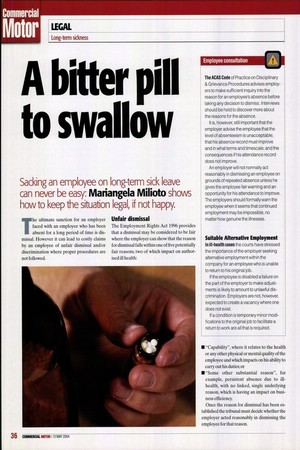A bitter pill to swallow
Page 36

Page 37

If you've noticed an error in this article please click here to report it so we can fix it.
Sacking an employee on long-term sick leave can never be easy: Mariangela Milioto shows
how to keep the situation legal, if not happy.
The ultimate sanction for an employer faced with an employee who has been absent for a long period of time is dismissal. However it can lead to costly claims by an employee of unfair dismissal and/or discrimination where proper procedures are not followed. Unfair dismissal The Employment Rights Act 1996 provides that a dismissal may be considered to be fair where the employer can show that the reason for dismissal falls within one of five potentially fair reasons, two of which impact on authorised ill health: • "Capability", where it relates to the health or any other physical or mental quality of the employee and which impacts on his ability to carry out his duties; or
• "Some other substantial reason", for example, persistent absence due to illhealth, with no linked, single underlying reason, which is having an impact on business efficiency.
Once the reason for dismissal has been established the tribunal must decide whether the employer acted reasonably in dismissing the employee for that reason. Implications of the Disability Discrimination Act 1995
Under the terms of the act an employer is under a statutory duty not to discriminate against disabled people, and to make reasonable adjustments in order to accommodate the disabled person.
A person will be considered to be disabled if he has a physical or mental impairment which has an adverse effect on his ability to carry out normal day-to-day activities; and the adverse effect is substantial and long-term.
The courts have found that many illnesses fall within the protection of the act. This requires employers to consider how an employee's working patterns can be adjusted to accommodate his disability. Only if adjustments would make no difference, or are not reasonable or practicable, will dismissal be justified. Managing absence Courts and tribunals have consistently held that if absence becomes commercially damaging employers are entitled to say "enough is
enough". Provided that the correct procedures are followed, a dismissal in such circumstances is likely to be held to be fair. Sickness absence policy The company's sickness absence policy should be followed in full as soon as an attendance problem becomes apparent. In order to have an objec tive and fair way of picking out the worst absence records, it may be helpful to adopt a common 'trigger' for review ing absence records. These mech
anisms should be included in a company's policy. Medical evidence When absences are related employers should seek medical evidence from the employee's doctor or ask the employee to see the company
doctor before considering dismissal. Even where the absences appear to be unconnected seeking medical advice is recommended to determine if there is an underlying medical condition which explains the absences. With long-term sickness, obtaining medical evidence is vital. Employers should ask the doctor about the exact nature of the medical problem, a likely date of return and what duties the employee will be able to carry out. The doctor should also be asked if the employee's condition may fall within the statu
tory definition of disability. The dismissal of an employee for ill-health will always be a management decision, albeit with medical input. Hopefully the adoption of clear procedures, if recognised by the medical profession, will be of benefit to employers and employees alike. •
Mariangela Milioto is a solicitor at the international law firm DLA. Employee consultation
The ACAS Code of Practice on Disciplinary & Grievance Procedures advises employers to make sufficient inquiry into the reason for an employee's absence before taking any decision to dismiss. Interviews should be held to discover more about the reasons for the absence.
It is, however, still important that the employer advise the employee that the level of absenteeism is unacceptable; that his absence record must improve and in what terms and timescale; and the consequences if his attendance record does not improve.
An employer will not normally act reasonably in dismissing an employee on grounds of repeated absence unless he gives the employee fair warning and an opportunity for his attendance to improve. The employers should formally warn the employee when it seems that continued employment may be impossible, no matter how genuine the illnesses. Suitable Alternative Employment
In ill-health cases the courts have stressed the importance of the employer seeking alternative employment within the company for an employee who is unable to return to his original job.
If the employee is disabled a failure on the part of the employer to make adjustments is likely to amount to unlawful discrimination. Employers are not, however, expected to create a vacancy where one does not exist.
If a condition is temporary minor modifications to the original job to facilitate a return to work are all that is required.




















































































































































































































